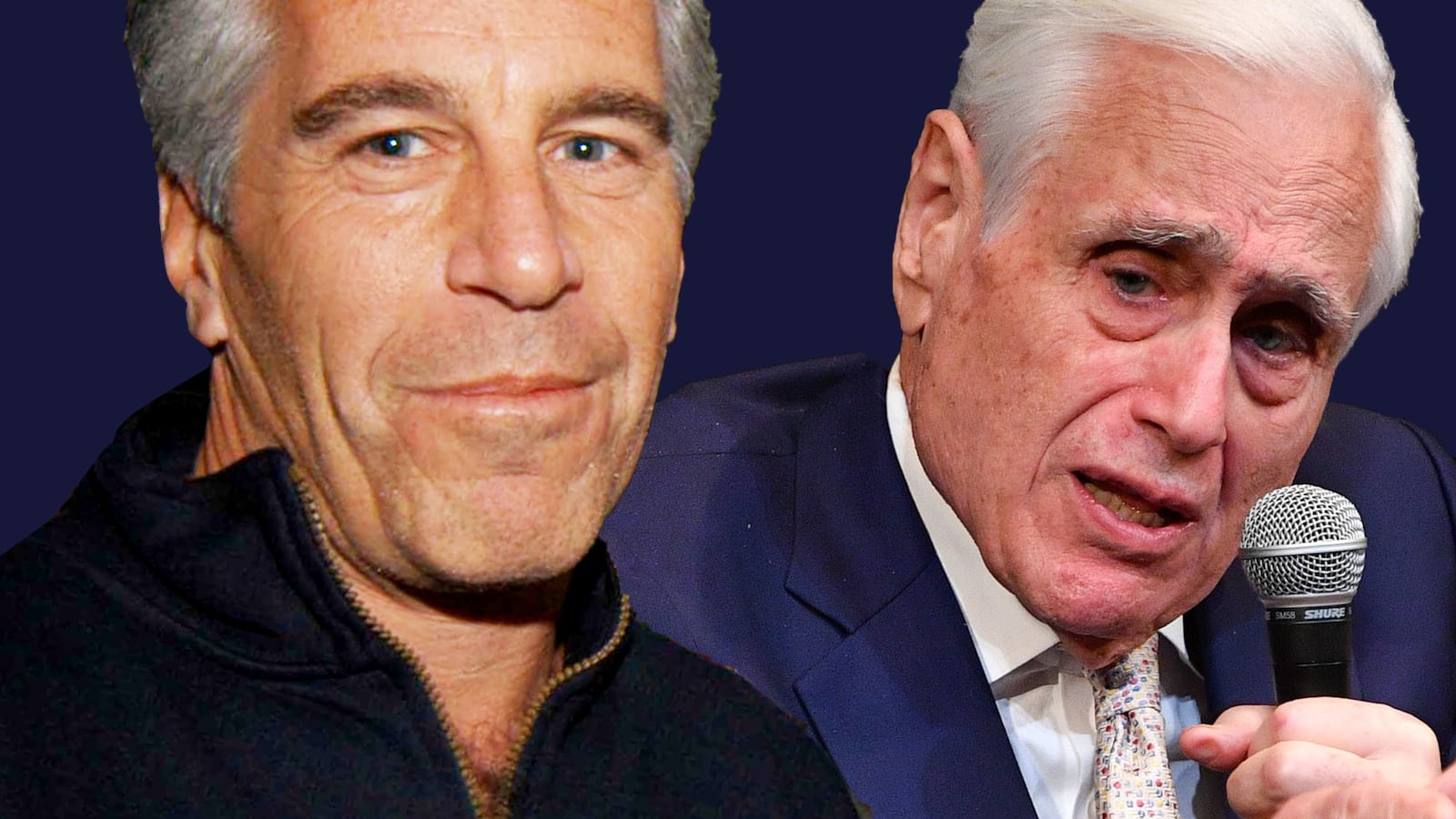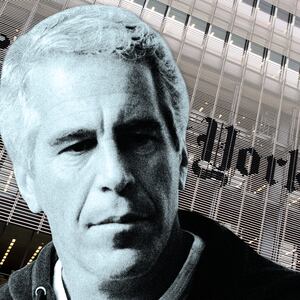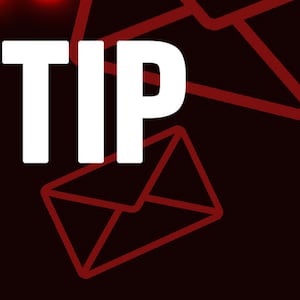Name-brand journalist Edward Jay Epstein was seduced by the charms of accused pedophile Jeffrey Epstein more than three decades ago. Yet even after the Miami Herald, multiple lawsuits and law enforcement authorities detailed how he sexually abused dozens of teenage girls and sometimes raped them, the late Jeffrey Epstein’s spell apparently remains strong.
“Look, take this about Jeffrey. He is the poster boy for rehabilitation,” said the 83-year-old Epstein (no relation to the convicted sex offender who authorities said hanged himself in his jail cell at New York’s Metropolitan Correctional Center a month after his July arrest on new federal charges of sex trafficking with minors). “He went to prison [after pleading guilty to reduced charges in 2008]. He served his term [13 months, nine of them on work-release that allowed him daytime visits to his Palm Beach, Florida, office]. He got out. The U.S. attorney’s office said he stuck completely to the terms of his parole. He registered as a sex offender—which is no fun, but which was something he was supposed to do. And he made $500 million.”
In an exclusive interview with The Daily Beast, Edward Epstein added: “I did hang around with Jeffrey because I was fascinated with him. For one thing, the women around him were some of the most beautiful women I’ve ever seen in my life. These were not underage women. They were women like [former model and Miss Sweden] Eva Andersson and [actress] Morgan Fairchild. None of them were really girlfriends of his, but they hung around him…
“I don’t understand Jeffrey,” Edward continued. “I can’t conceive of why he would go out with an underage woman, unless your theory’s right that he’s a pedophile…It wasn’t like he was some sort of ugly gnome that couldn’t get a girl…When I knew him, I never saw so many good-looking women who stayed in his little orbit.”
Edward Epstein also cast doubt on the notion—advanced by the November 2018 Miami Herald investigation of Jeffrey’s extraordinarily lenient 2008 sentence for soliciting prostitution and sex trafficking with a minor, an article that ultimately prompted the resignation of Donald Trump’s labor secretary, former U.S. Attorney Alexander Acosta, and new federal charges from the Southern District of New York—that Jeffrey destroyed dozens of young lives.
“I’m not sure he destroyed their lives,” Edward said. “He paid them money, and they went on for six or seven years giving him massages. I don’t know if that destroyed their lives. Getting a massage or getting a girl to masturbate you doesn’t necessarily destroy your life.”
(One of Jeffrey’s victims, Jennifer Araoz—who is now suing his estate and says the financier raped her at age 14—told a courtroom after Epstein’s suicide, “The fact that he felt entitled to take away my innocence…hurts me so much.”)
Edward added: “Everything about Jeffrey was a con. I never thought, ‘here’s an honest guy.’ I just thought here’s a New York character…I think it’s a terrible thing, and a stupid thing, and a perverse thing, to have any sex with underage girls…I don’t believe many of the stories about Glenn Dubin, Prince Andrew—I don’t believe that they’re stupid enough, if they knew the girl was underage, why would anyone? You could be compromised, you could be blackmailed, especially by Jeffrey. Bill Clinton? They’d have to be out of their minds.”
Edward stressed: “I never even discussed these things with Jeffrey”—whom he described as an unreliable witness and “a liar,” once claiming to Edward that he was, among other things, a private detective, and, another time, that he flew every month to Moscow to meet with Vladimir Putin. “Maybe he was a calculated liar, but I had a feeling it was pathological.”
“If you say he’s a pedophile and he’s going out with children, that’s not anything I know,” Edward said, noting that he never rode on Jeffrey’s jet, visited any of his homes beyond the East 71st Street townhouse, or was offered a massage. “Nineteen is ‘teenage’ too.”
Pressed in the interview to account for credible allegations in official government documents as well as the media, Edward conceded that young women working for Jeffrey “recruited underage girls…mainly from massage parlors, by the way—that’s what his lawyers say, but that doesn’t make it any more legal,” Edward said. “I can’t imagine what happened, ok? I think he asked for younger and younger women. That’s just my guess.”
Yet Edward suggested that Jeffrey’s July 2019 arrest and the new charges—a decade after he served his original time—were an act of bad faith on the federal government’s part.
“If he bribed [Acosta or other officials] to get the deal, then obviously that’s a whole other criminal business,” Edward said. “But if they gave him the deal, if he negotiated and got it, then that was the price that society agreed on, and that was the price that he paid.”
Despite news reports about a U.S. Marshals investigation of Jeffrey’s 2018 plane trips with apparently underage girls as young as 11 or 12, Edward said he’s unaware that his onetime friend was acting suspiciously and possibly violating the terms of his sentencing agreement.
Edward Jay Epstein, who has contributed articles to The Daily Beast, spoke by phone as Graydon Carter’s new online magazine, Airmail, published My Tea with Jeffrey Epstein, a lengthy and oddly non-judgmental chronicle of Edward’s 32-year, on-again, off-again friendship with the mysterious, Gatsby-like financial adviser.
After Jeffrey’s arrest in July, Edward refused a request from The Daily Beast to discuss his unusual pal.
He did so, he explained, “because Jeffrey was alive, and I didn’t want to add to the misery of someone who was in prison.”
Known for his book-length investigations of the JFK assassination, the financial shenanigans of Hollywood, and the secret wars between the American and Russian spy agencies, Edward Epstein said he befriended the self-avowed financial whiz in the late 1980s, accepted personal favors from him—including first-class plane tickets and free lodging—but then didn’t speak with him for 24 years. (At least one other journalist has admitted taking favors from Jeffrey Epstein—former New York Times business reporter Landon Thomas Jr., who wrote a puff piece about him while he was facing criminal charges and successfully solicited a $30,000 charitable donation from Epstein for a Harlem school.)
The breach with Edward occurred after Jeffrey cut him off over Edward’s thinly-veiled 1989 Manhattan, inc. “Wall Street Babylon” column (in which Jeffrey wasn’t named but was described in detail) that exposed some of his dubious business practices and brought unwelcome attention from the Securities and Exchange Commission.
In the Airmail article, Edward wrote about a “frantic call from an executive at Simon & Schuster” who had met Jeffrey at Edward’s December 6, 1988 birthday dinner.
“He told me that he had given Epstein $70,000 to invest in a deal to take over the chemical company Pennwalt. After sending the money, he had not received the necessary papers, and Epstein was no longer returning his calls. He phoned one of the principals in the deal, who said he had never heard of the executive,” Edward wrote.
Edward recounted how he used a computer program Jeffrey had provided him to browse through Jeffrey’s financial transactions, where he found dozens of demands for the return of investment money and evidence of a twice-bounced check.
“As I read through this material, I found nothing about the publishing executive’s money, but I grew increasingly queasy about Epstein,” Edward wrote, adding that he never discovered anything about the Simon & Schuster exec’s money.
On the phone, Edward repeatedly refused to identify the publishing mogul, who he recalled had offered Jeffrey and his date at the birthday dinner a ride to Palm Beach on his corporate jet.
“I feel guilty about the whole thing because I introduced them,” Edward confided. “I’m not gonna tell you who it is—and the only reason is that I don’t want him screaming and shouting at me…He’ll go ballistic. You can guess who it is…To tell you the truth, he was a friend of mine and at a certain point he told me he did get his money back.”
Attempts to reach Simon & Schuster’s larger-than-life former chief executive, Richard E. Snyder, were unsuccessful, so The Daily Beast cannot confirm whether he is the publisher in question.
Describing their falling-out in the Airmail article, meanwhile, Edward wrote that he didn’t identify Jeffrey in his Manhattan, inc. column “because he refused to speak to the fact-checker.”
“You caused me a lot of trouble,” Edward—in his Daily Beast interview—recalled Jeffrey fuming in a furious phone call over the column, which suggested he had improperly used inside information in one of his deals.
“I never disliked Jeffrey, by the way,” Edward said. “He disliked me, but I never disliked him.”
Their relationship—which had included invitations to parties at Edward’s Upper East Side apartment and piano-concert soirees at the home of music and art philanthropist Stuart Pivar—suddenly resumed in 2013, Edward Epstein said, after he published a New York Review of Books essay about his old college professor and mentor Vladimir Nabokov, and Jeffrey invited him to his East 71st Street mansion to discuss the author of Lolita, Jeffrey’s favorite novel.
Jeffrey boasted that he kept copies of Nabokov’s masterpiece in various bedrooms of his residences and aboard his private jet, nicknamed by the press the “Lolita Express.”
Their relationship continued well into 2019, with personal visits, tea at the mansion, walks in Central Park and email exchanges, Edward said.
“The last time I communicated with him was actually over emails, when Robert Kraft was arrested,” he recounted, citing Jeffrey’s curiosity about the New England Patriot owner’s February arrest for receiving handjobs in a Florida massage parlor. “His position was pretty interesting: If Robert Kraft and all the people going to that parlor were committing a crime, can the police just sit there and watch lots of people committing crimes and not interfere? That was the question I asked him.
“And he answered that ‘the police were going through my garbage and everything, and if they had found that the girls were underage’—and he never himself admitted that they were underage—‘they should have stopped it.’ In other words, Jeffrey’s point was that the girls were acting illicitly if they were underage.”
The Airmail article—actually Chapter 46 of Edward’s unpublished memoir, he said—also reports ethically problematic details about its author: that Edward accepted free lodging in the Santa Monica, California, apartment that Jeffrey rented for then-girlfriend Eva Andersson, and also accepted free first-class airline upgrades—which turned out to be illegal—from Jeffrey, who was later the subject of one of his columns for the now-defunct business magazine Manhattan, inc.
In Airmail, Edward recounted an early meeting with Jeffrey in 1987: “As we finished the tea, I mentioned I was leaving for Spain on Monday. ‘How do you go?’ he asked. ‘Iberia Airlines,’ I said, adding that I always flew coach. ‘If you like, I can upgrade you to first class. Much better food.’ ‘How?’ ‘Drop your ticket off with my doorman tomorrow morning. It won’t cost you a penny.’
Edward told The Daily Beast that he took advantage of Jeffrey’s plane-ticket largesse a few more times after that, until an official at a Japanese airline rejected his first-class ticket because it was bogus, and sent him back to the economy cabin.
Edward said he understood that Jeffrey somehow had gained access to various airlines’ computer systems and was able to claim first-class seats.
After the Japanese airline embarrassment, “I certainly did confront him,” Edward said, describing the fake first-class tickets as “theft of services.” “He said ‘don’t ask me anything. It works one-third of the time.’ ”
Asked if it gave him pause as a journalist to be accepting favors and freebies from a potential subject of his journalism—and one who Edward acknowledged clearly wanted to be written about—he breezily replied: “I wasn’t writing about Jeffrey, but it gave me great pause,” but only because the first-class plane tickets turned out to be fake.
“I didn’t plan to write anything about him [back in the late ‘80s]. He was no one,” Edward said by way of justifying his acceptance of Jeffrey’s gifts. “Yeah, Jeffrey wanted a column, but I had no intention of writing it…And if I wrote it, I’ve never written a favorable column about anyone…I take that back. I have written one or two favorable columns. But normally, you know, people hated me…I would never have accepted a favor if I planned to write a column about him. But an interview’s a favor. When [former International Monetary Fund director and alleged rapist] Dominique Strauss-Kahn gave me an interview, it’s a favor to a journalist to get an interview, because otherwise you can’t sell the story.”
Of course, as Edward Epstein acknowledges, he did end up writing about Jeffrey in the column that interrupted their relationship.
But he said he has no regrets. “If you asked me this a few years ago, I would have said I regret writing that piece that got him angry at me. But now I’m sort of happy I wrote that piece and he stopped speaking to me because at least I have no connections to his perverse acts…Whatever he did, it was pretty bad.”
“I hung around—and gone on vacation with—lots of dubious characters,” he said, adding with a laugh. “Remember there was a character on the radio called Boston Blackie? His logo was ‘friend of those who have no friends.’…I don’t make personal judgments. That’s not my business.”



